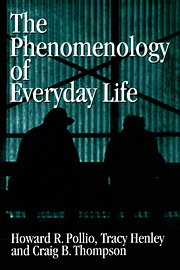Book contents
- Frontmatter
- Contents
- Preface
- PART I EXISTENTIAL PHENOMENOLOGY AND THE SCIENCE OF PSYCHOLOGY
- PART II GROUNDING THE WORLD OF EVERYDAY LIFE
- PART III SELECTED TOPICS FROM EVERYDAY LIFE
- 6 Feeling Alone
- 7 Making Amends: The Psychology of Reparation
- 8 Love and Loving
- 9 Falling Apart
- 10 The Meanings of Death in the Context of Life
- PART IV THE PHENOMENOLOGY OF EVERYDAY LIFE
- References
- Name Index
- Subject Index
8 - Love and Loving
Published online by Cambridge University Press: 04 August 2010
- Frontmatter
- Contents
- Preface
- PART I EXISTENTIAL PHENOMENOLOGY AND THE SCIENCE OF PSYCHOLOGY
- PART II GROUNDING THE WORLD OF EVERYDAY LIFE
- PART III SELECTED TOPICS FROM EVERYDAY LIFE
- 6 Feeling Alone
- 7 Making Amends: The Psychology of Reparation
- 8 Love and Loving
- 9 Falling Apart
- 10 The Meanings of Death in the Context of Life
- PART IV THE PHENOMENOLOGY OF EVERYDAY LIFE
- References
- Name Index
- Subject Index
Summary
Despite all of the attention devoted to it, there are few aspects of human experience more puzzling, paradoxical, or problematic than that of love. It is a topic that generates endless words and strong and confusing emotions: We often express a desire for love yet are afraid of being consumed by it; we often assume that we know what it means to love or to be loved, yet we have profound difficulties in describing what it is or how we experience it. We also often seem to wonder whether the love we now feel is “real” or “genuine,” as though a counterfeit variety could masquerade as true love and not be readily recognized for what it is.
What the word love means varies a great deal depending upon who uses it and how it is used. What seems to be agreed upon, however, is that there are many different kinds of love. Some years ago, Rollo May (1969) noted that Western culture tends to think about love in terms of four different categories: (1) sex, lust, and libido; (2) eros, construed as an urge toward higher forms of relationship and creativity; (3) philia, or brotherly love; and (4) agape, or divine, selfless love. Any authentic love between people is, in May's view, “a blending, in varying proportions of these four.”
Another distinction often made in regard to love is that between being moved and moving. Is love something one experiences as overcoming – something we fall into, either in spite of or against our will – or is it something we choose and willingly cultivate (Fromm, 1956)?
- Type
- Chapter
- Information
- The Phenomenology of Everyday LifeEmpirical Investigations of Human Experience, pp. 227 - 262Publisher: Cambridge University PressPrint publication year: 1997



